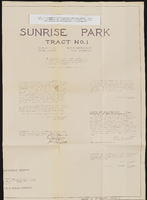Search the Special Collections and Archives Portal
Search Results

Casiano Corpus Jr. oral history interview: transcript
Date
Archival Collection
Description
Oral history interview with Casiano Corpus Jr. conducted by Cecilia Winchell and Stefani Evans on February 14, 2023 for the Reflections: the Las Vegas Asian American and Pacific Islander Oral History Project. In this interview, Corpus Jr. details a difficult childhood in the Philippines, where society is highly socioeconomically stratified. He recalls his parents working a number of jobs to support their large family, and as soon as he finished his primary schooling, he also started working in construction. When his father was finally petitioned by his uncle to move to the United States, Corpus was at first reluctant to go, since he had a familiar life in the Philippines, but has come to love the United States and the life he created for himself. Immediately after moving to the United States, their family landed in Las Vegas, Nevada, and Corpus began working a number of jobs. He started out as a busboy at a Chinese restaurant before deciding that he wanted to work in a casino and moved to Union Plaza. His current job is as a porter at Palace Station, where he has been for the past 31 years. He has also been working to unionize Palace Station and Station casinos with the Culinary Union for the past twelve years. He talks about the hunger strike he organized, why he organizes with no fear, and what he hopes to see out of his efforts throughout the interview.
Text

Dr. Deborah Kuhls oral history interview: transcript
Date
Archival Collection
Description
Oral history interview with Dr. Deborah Kuhls conducted by Barbara Tabach on December 29, 2017 for the Remembering 1 October Oral History Project. In this interview, doctor Deborah A. Kuhls describes the preparation and procedures implemented at the University Medical Center of Southern Nevada (UMC) during the night of the October 1, 2017 mass shooting in Las Vegas, Nevada. She describes her experiences from that night and into the next morning, starting from when the trauma center first learned about the shooting to when patients began arriving. She goes into detail on the hospital's Military-Civilian Trauma System Partnership, which allowed for the installation of a second trauma area to treat the large volume of patients. In addition to the events at the hospital, Kuhls talks about the flurry of activities during the week of the shooting, including interviews with various media, the statewide meeting for surgeons, fellows, and residents where "stop the bleed" training was provided, and general meetings with various government officials, including Donald Trump. Deborah Kuhls also discusses the emotional impact of the shooting and its aftermath as well as her goals for the future of trauma in the medical field.
Text

Elena Newman oral history interview: transcript
Date
Archival Collection
Description
Oral history interview with Elena Newman conducted by Cecilia Winchell and Stefani Evans on April 11, 2022 for the Reflections: the Las Vegas Asian American and Pacific Islander Oral History Project. In this interview, Newman discusses her childhood in Dagupan, Pangasinan, Philippines. At the age of eighteen, she moved to Singapore for better work opportunities to help support her family. After meeting her husband, the couple moved to Las Vegas, Nevada. Since moving to Las Vegas, Newman has spent her time working as both a guest room attendant and shop steward at Mandalay Bay. She is also a part of the Culinary Workers Union, and she discusses how helpful the union is to the livelihoods of the many workers in the casino industry.
Text

Nadine Cracraft oral history interview: transcript
Date
Archival Collection
Description
Oral history interview with Nadine Cracraft conducted by Barbara Tabach on November 27, 2017 for the Remembering 1 October Oral History Project. In this interview, Nadine Cracraft discusses the development of her career in child and family therapy after moving to Las Vegas, Nevada in 1991. While describing the work she has done, Cracraft talks about the volunteer counseling services she provided for the survivors of the October 2017 Las Vegas mass shooting. She specifically mentions working with Aria staff members who were struggling with the aftermath of the shooting as well as her time spent working with First Friday to help those impacted by the traumatic event. Throughout the interview, Cracraft explains the different ways people manage their post-traumatic stress disorder and how this knowledge influenced her care of the survivors.
Text
Jean Ford Photograph Collection
Identifier
Abstract
The Jean Ford Photograph Collection (1964-1977) contains black-and-white photographic prints, contact sheets, and transparencies of Nevada politician and activist Jean Ford. The collection includes photographs of Jean Ford with the Nevada State Park Commission and various Nevadan politicians; Ford lecturing and campaigning; and of the 1977 National Women's Conference in Houston, Texas.
Archival Collection
Vassili Sulich Photographs
Identifier
Abstract
The Vassili Sulich Photographs depict dancer and choreographer Vassili Sulich from 1950 to 2011. The photographs primarily depict Sulich dancing in ballets in France, Croatia, Germany, England, and the United States. The photographs also depict ballets choreographed or directed by Sulich at the Nevada Dance Theatre, which he founded in 1972 in Las Vegas, Nevada.
Archival Collection
JMA Architecture Studio Records
Identifier
Abstract
The JMA Architecture Studio Records are comprised of architectural records (1953-2002) created by the American architect Jack Miller and/or his architectural firm, known as both Jack Miller & Associates, Architects, & Engineers, Inc and JMA Architects, Inc. This collection includes 30.25 linear feet of materials documenting work on over 250 projects. The collection focuses on Las Vegas and Reno, Nevada. The materials feature photographs of the firm’s projects and hand-drawn architectural drawings, ranging from pencil and ink on tracing paper preliminary sketches to ink on Mylar (TM) construction documents. The drawings also contain work from a number of consultants, engineers, and other architects who collaborated on the development of the various projects. The collection includes architectural drawings for hotels, casinos, integrated casino resorts, office towers, multi-family residential developments, and custom single-family homes.
Archival Collection
Joshua Abbey Papers
Identifier
Abstract
Collection is comprised primarily of files from approximately the early 1980s to 2017 detailing Joshua Abbey's theater and film career; his involvement with environmental efforts in Southern Nevada such as the Citizens Against Nuclear Waste in Nevada (CANWIN); and his involvement with the Jewish community in Las Vegas, including the Jewish Film Festival, the Jewish Federation, Temple Beth Sholom, and other organizations. The collection also includes information about the Jewish Community Center from the 1950s and a file on the film production of
Archival Collection
Dorothy Dorothy Papers
Identifier
Abstract
The Dorothy Dorothy papers (approximately 1913-1986) document the life of singer, songwriter, columnist, pilot, and farmer, Dorothy Dorothy. Materials contain genealogy records, correspondence, business and organizational records, local history, sheet music, artifacts, and two boxes of photographic prints. Also included are materials relating to her active involvement with animal rights campaigns.
Archival Collection

